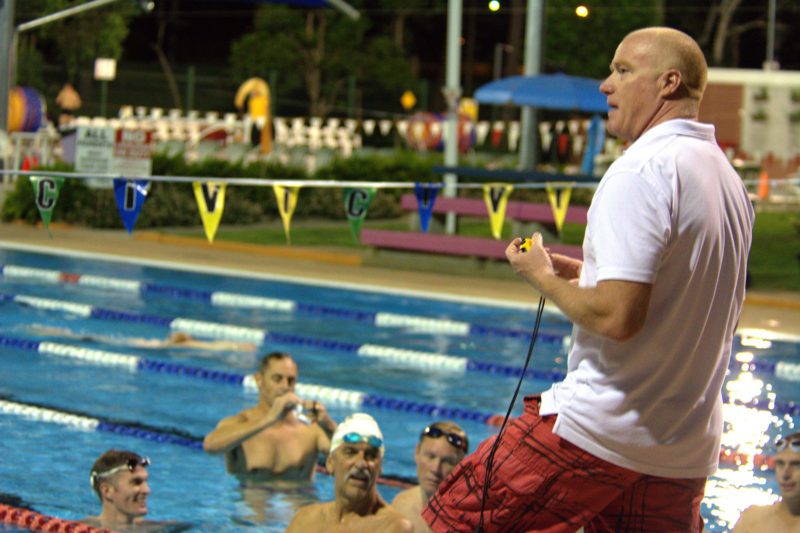019 – Trent Patten – Triathlon Coach
Red Dog Triathlon Training

Trent Patten is one of Australia’s leading age group triathlon coaches.
At any one time he is helping hundreds of athletes – of all ability ranges – achieve their personal goals.
He trains world champions, national champions and has helped countless novices prepare for their very first event.
Trent has a unique ability to tap into the things that drive individuals and use them to motivate commitment, effort and performance.
In this episode of the Team Guru Podcast we talk about Trent’s philosophy on coaching.
He tells us about the lessons he learned from his time coaching elite swimmers and his transition to age group triathletes.
He steps us through a week in the gruelling life of triathlon training.
And he tells us about that moment he realised he was no longer just a coach – but a small businessman too.
Lessons Learned
Here’s what I took from the episode:
Swim Coaching
In his first coaching job, as Rick Van Der Zant’s assistant at Yeronga Park, Trent learned that a squad must be inclusive – that athletes of all levels should have as much contact with each other as possible
When Trent started coaching, his main motivation was to maximise individual potential. This motivation has been consistent from his early career experiences coaching elite swimmers to his current role as head of Red Dog Triathlon Training where he predominantly coaches age group (adult) triathletes
Trent was a coach for the Paralympic swim team during the Sydney 2000 games. That experience had a huge impact on his outlook as a coach. He realised that there was much more to be achieved as a coach than working with elite level athletes
For young swimmers, who train up to 11 times per week, the commitment required by the whole family is phenomenal – time, energy and money. Trent realised as a young coach it was very important to be aware and learn to manage parent expectations
Transition to Triathlon Coach
Red Dog Triathlon Training (RTT) started when Trent began coaching a small number of good friends who in their late 20s and early 30s were looking to get back into physical activity
Those triathletes quickly enjoyed some outstanding results – which was noticed by other athletes who soon wanted to join the squad
From 15 athletes in 2008, RTT has grown to over 300 athletes in early 2016
Trent sees training swimmers (mainly kids) to triathletes (mainly adults) as fundamentally the same. The keys are:
- Be passionate about what you do
- Show an interest in your athletes
- Challenge each athlete to be better each time they train
Motivating Individuals
Trent is known as a master motivator
He understands that everyone that comes to his squad is driven by different goals – completing their first triathlon, winning their age group, turning professional, looking good for a wedding or getting ready to have a baby
He likes to tap into those motivators and remind individuals of those goals every time he sees them at training

Coaching Challenges
Trent has learned to establish clear boundaries and expectations for him and members of the squad
It’s important for him to be clear and consistent in what he expects of individuals and for them to understand his needs as a coach
With over 300 athletes in his charge, Trent has learned that some requests that come his way may seem fair and reasonable, but would become impractical and impossible if each member of his squad were to make the same request. Trent sees his challenge as managing this concept while continuing to treat each of his athletes as individuals
Coaching Philosophy
For Trent, coaching consists of art and science. Science dictates the way sessions and training programs are structured, but he has a firm belief that his skills lie within the art of coaching – the way he interacts with his athletes as people
He enjoys the challenge of getting the best out of individuals at every session and every event – encouraging and challenging them
There is a lot of technology available to triathletes to monitor their training but Trent has a concern that getting too bogged down with numbers can put some people at risk of losing enjoyment for the sport
‘There’s something to be said for showing up on the day and giving it your best’
Business Success
Trent began coaching triathlon at the perfect time. Triathlon is growing rapidly as a sport. Between 2010 & 2015 national annual membership has more than doubled (9,744 – 21,445)
Culture is Key – RTT started small, with a strong culture of 15 committed athletes. The business has grown from this humble beginning by attracting like-minded athletes, who share similar goals and work ethic.
‘We like to work hard and play hard, that’s our culture’
Fostering this culture, and the growth in Triathlon as a sport, has seen a 1900% increase in business over a 7 year period
During this growth, Trent came to a point where he realised he couldn’t continue to do everything himself. He realised that his real value was in coaching, not in business administration. He outsourced those responsibilities so he could concentrate his efforts where his athletes needed them most
RTT has extended to Red Dog Pups – a squad for kids. Trent sees this as a natural step for his business. Many of the members of the squad have had their own kids and are interested in given them an opportunity to participate in a sport that they enjoyed
Trent plans to continue coaching right through his career – getting up at 5.00 each morning to run a track session or get on the bike is something he really enjoys:
‘When you do something you love you don’t work a day in your life’
He also says he plans to grow old with his squad.
A Week in the Life
Swim
Duration: 1 hour
Distance: 2.5km – 4km
Frequency: 2 – 4 sessions per week
- Swim sessions are held at a pool
- Athletes are broken into lanes according to their ability and fitness
- The squad trains together for the warm up
- The main set (the hard work part of the session) is usually done within their lanes (group ability and speed)
- Through the main set Trent gives each swimmer some technical advice or encouragement about their effort level – ‘to send them home happy, feeling like they’ve achieved something’
- Finish with a warm down
Trent believes it’s important that he speaks to each athlete at every session on both a personal and professional level
Cycle
Duration: 1.5 – 3 hours
Distance: 60km – 80km
Frequency: 2 – 3 sessions per week
- The squad is split up according to speed and level of ability – 3 groups
- Wednesday morning is a coached ride. Usually on a loop where Trent can position himself around the course to offer coaching and support
- Friday – indoor session on a simulated course. Squad members can compete against each other – it’s a very safe and controlled environment
- Saturdays – long easy ride. Squad is broken into ability groups. Senior squad members lead different groups
‘Above all else I try to provide a safe and social environment for every ride.’
Run
Duration: 1 – 1.5 hours
Distance: 5km – 10km
Frequency: 2 – 3 sessions per week
- Tuesday morning track session – RTT’s most popular session because it’s inclusive – it allows all the athletes to train together no matter their fitness level
- Thursday – long run. Squad breaks up into ability groups and completes and ‘out and back’ course
Events
RTT athletes compete in just about every triathlon across the country – large and small. At the biggest events in Australia, the Noosa and Mooloolaba Triathlons, the Red Dog kit is impossible to miss
Trent selects a couple of events each year and encourages the majority of members to participate so that training schedules can be aligned
‘Training in a group provides so many benefits for individuals’
Currently the squad is targeting the Port Macquarie 70.3 and Ironman event on 1 May. There are a lot of people in the squad who will be completing their first Ironman distance
Ironman distance Triathlon consist of:
- 3.8km swim
- 180km bike
- 42km run
Preparing for an Ironman distance triathlon is a huge commitment for athletes. They train between 12 and 20 hours of training per week over a 3-month period.
Share this:






